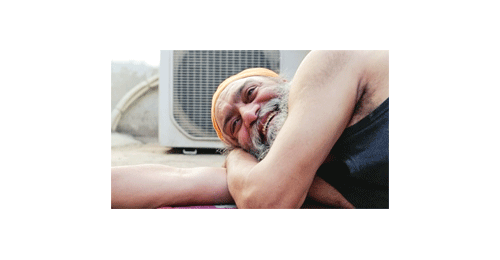
Udta Punjab, Abhishek Chaubey’s 2016 film, brought the extent of Punjab’s drug problem into the mainstream, and people were shocked to see that behind the balle balle jollity of the people of the state, there was darkness and torment.
Shilpi Gulati’s feature-length documentary Taala Te Kunjee (Lock And Key) looks at the alcohol and addiction problems in the state, but focuses on the positive side — the stories of recovered addicts, who dissect their past without shame, and look on the future with hope. One of them — Gurpratap Singh gets married to a woman who knows about his fight with addiction and is willing to love him regardless.
The film has been backed by the Hermitage de-addiction and rehab centre, in Amritsar, where the recovered addicts and their families tell their stories to inspire others. And behind the narrative of every man who went though the long and painful recovery process (the withdrawals and cold turkey bits are not filmed, giving them the dignity they now deserve), is a woman — sometimes the mother, but mostly the wife, who stood by their sons or husbands and brought them out of hell. Every line of their faces, every tentative smile tells of the suffering they went through — including violence, abuse and financial ruin. (There must be female addicts too, but Gupta has for obvious reasons, not brought them to the fore.)
One of the men talking about his experiences with remarkable wit, talks of a man trying to push his hand into a bottle. When asked why, he says he wants to go into the bottle. On being told it’s impossible, he says, “Why? Thirty acres of my land went into this bottle, my father and mother went into this bottle.” After recovery, it is perhaps possible to resort to black humour, but when the addiction demands to be fed, a wife throws her son in front of her husband’s car believing that he will stop. “He did not stop,” she says, reliving the anguish.
The film begins with a benign, smiling Jasbir Singh, looking older than his 57 years, going yoga and watering his plants. He looks beatific however, and after over a decade of multiple drug abuse, says he gets drunk on life. His colleagues say that looking at him today, they believe there is a god.
Now, the five men the film follows, help counsel others, and are able to tell their stories with a deceptive calm, a sense of wonder even at the miracle that happened to them. Gurpratap Singh, points to the places from where drugs were smuggled into his school, points to a tiny room where he hid his stash and went for his heroin fix.
Nitin Gupta, whose liver almost packed up due to twenty years of alcohol abuse, was given three months to live by doctors. He pulled through and kicked the bottle. One of the men spent the money meant to get blood for his wife’s surgery on booze, and the woman was forced to leave the hospital bed and arrange for blood on her own.
One of the men talks of how he beat his mother and sister who tried to stop him from going out to get drunk or stoned.
In spite of stories like this, the tone of the film is surprisingly upbeat, the wives who went through harrowing years with men in the grip of addiction, now look happy and hopeful, but there is also a kind of fear in their eyes, as if they will never really forget the nightmare. When two of them look at their wedding albums, a shadow does cross over their faces.
One of the wives says matter-of-factly, that liquor is an inextricable part of life in Punjab — every occasion calls for drinking, and there are plenty of shots of men dancing at weddings or parties, their inhibitions probably dulled by booze.
Dr JPS Bhatia, who treats addicts attempts an answer to “Why Punjab?” He believes it is because Punjab has always been in a state of conflict, historically, from the various invasions to the militancy period. The pain caused by this conflict drives people to drink and drugs.
But where there is lock that needs to be opened, Gulati’s film seems to say, there is key that fits.
(Deepa Gahlot is a critic, columnist, editor, author and curator)






